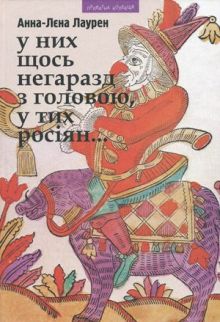August 16, Kyiv launched the Ukrainian version of Anna-Lena Lauren’s book De ar inte kloka, de dar ryssarna (“They are not all there, those Russians”). This young lady is a Swedish-speaking journalist, born in Finland, who worked as a Moscow-based reporter with the Finnish Broadcasting Company YLE in 2006-10. Her book previously appeared in Finnish, Norwegian, and Russian versions. Lauren describes her Russian experience with a keen and sympathetic insight. I was fortunate enough to interview Lauren and learn from her what she thought was the difference between Russia and Ukraine.
“Frankly speaking, I decided to write this book on the spur of the moment. I had spent several years working in Moscow and traveled a lot across Russia previously. I just wanted to share my experience, things that disgusted me in Russia, a country I love, also other little things that you often shrug off or simply forget all about.”
What made you choose the title?
“I guess a title like ‘They are not all there, those Russians’ will sound strange in Ukrainian. When I was a small girl I was fond of reading Asterix and Obelix books, and I remember reading Ils sont fous, ces Romains, meaning these Romans are crazy, but that was a good-humored statement. The characters of the books were actually fond of Romans because they loved the confrontation with them. It is true that now and then you find yourself in a situation in Russia when you think that there is a bat in their belfry. I had tried to figure out the reasons and managed to realize a lot but not all of them, simply because I was not part of their culture. Well, that is how I chose the title, but in my book I wrote the Russians were not the only ones who ‘were not all there,’ that I might well look like a number one loony bin client in their eyes.”
Finland suffered the rule of two colonial powers, Sweden and Russia. How did your country succeed in achieving national statehood and showing current great progress?
“A very good question. A colonizing power is a notion that implies lots of meanings, including the British presence in Africa, the French one in Algiers. Finland did not exist as a state in the 12th century. There were peoples and regions that did not have any special authorities, so the Russians and Swedes were strongly tempted to conquer them. In the end, the Swedes did, thank God. Today’s Finland is part of Western Europe. Had it been part of Russia, it would have had an altogether different kind of culture and political system. Finland remained part of Sweden for 700 years, until annexed by Russia in 1809. After that it remained part of the Russian Empire for some 100 years.”
Your Finnish elite recognized the Russian tsar as their sovereign and, thus, no resistance effort was made.
“There was war at first, with Swedes and Finns fighting the Russian Empire, but it won in the end and conquered Finland. There is one other aspect. The Finns are pragmatic and they proved this virtue when they agreed to Russia’s annexation. They tried to find any possible advantages they could, and they did. Finland was accorded a great deal of autonomy. I realize that other peoples within the Russian Empire were not as fortunate. The tsar did not foresee big problems in Finland and the relationships were good until the late 19th century, when the Russification campaign began. It was then big problems started emerging, with Finns resisting. Previously, Finland had shown good progress, had its own parliament, currency, and central bank.”
What about Mannerheim and his alleged role in preserving Finland’s statehood in the 19th century?
“He did play an important role and ranks with Finland’s significant symbols, but there were other factors at play. He was an aristocrat and spoke Swedish; he also spoke idiomatic Russian, considering the years of service under the Russian tsar, French, and German, but his Finnish was bad.”
Finland and NATO, what do you think will happen?
“Our defense minister is all out for Finland’s NATO membership, but there is no one hundred percent proof that this will happen. The population is not ready.”
How would you explain this? The Russian factor, fear of the Kremlin’s wrath?
“The Russian factor might not be the main reason. Finland just does not want to see her lads being sent on NATO combat missions. The Finns believe that NATO membership might create an uncomfortable situation.”
You have written a book about Russia. Is there anything you could say about Ukraine? Do you think there are not any bats in the belfry here?
“Ukraine is a very interesting country, mainly because here you find a number of centers of influence. In Russia, there is only one center, the Kremlin. The same applies to the media, politics, and economy. I cannot say that Ukraine is a model democracy, but your country shows a lot more liberties, and your atmosphere is far more comfortable than that of Russia. A journalist would find working in Ukraine far more comfortable than in Russia.”
What about our arrests and trials over opposition leaders?
“I am sorry, but Yanukovych has been making a lot of bad mistakes. He should not have had Tymoshenko arrested because everyone can see the reasons behind these acts. Personally, I am very disappointed. I must have been naive when I assumed nothing like this would ever happen in Ukraine. What is happening in Ukraine is the evidence that your democracy is underdeveloped.”
Do you think the West adequately responded to these political court hearings in Ukraine?
“I think so. I know that Tymoshenko is no angel, but if they want to keep her behind bars, to prevent her from vying in the next election campaign, this will be a heavy blow to Ukraine’s international image.”
I also know that you are going to frequent Ukraine, and that you are planning another book. What will it be about?
“It will be about the ‘colored’ revolutions in Ukraine, Georgia, and Kyrgyzstan. I know that there are different views on the Orange Revolution in Ukraine. I am interested in the process, in the presence of such phenomena in post-Soviet countries, with the West believing that those who organized them were naive optimists. I believe that [your political leadership. – Ed.] should realize that it is high time they made your democracy match our Western standards. On the other hand building a democracy takes quite some time, more than a couple of years. I know that most people in Ukraine feel bitterly disappointed, but I still believe that the Orange Revolution was a significant occurrence. It served to change your [political. – Ed.] mentality. However, your people will keep feeling disappointed, for as long as they have your current politicians. That is your biggest problem.”









